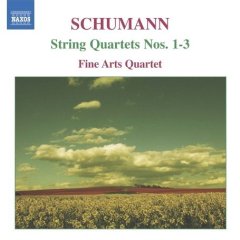

 |
 |
|
Schumann complete String Quartets Op 41  Fine Arts Quartet Naxos 8.570151
This is an excellent issue of the once neglected Schumann quartets, which are gradually creeping into the mainstream repertoire. These interpretations have a pleasantly rustic, bucolic quality; good-humoured rather than over-civilised. You could ask for a little more edge in the fleet scherzo of the first quartet, or a greater sense of inhabiting a post-Beethovenian sound-world. These quartets are played as Eclogues or Georgics, not Odes.
But there is no shortage of commitment, the players are obviously enjoy the works, nor is there any lack of leisurely, pleasing lyricism in the third quartet, so reminiscent of early Brahms. The slow, variation movement of Quartet 2 also shows the Fine Arts' unhurried approach at its best.
Few string quartets can boast as long a continuous history as the Fine Arts of Chicago, who have celebrated their diamond jubilee; indeed three of the current members are about to reach their silver one. Perhaps this tradition gives them a satisfyingly retro, unforced approach.
In this respect they break the usual pattern of ‘highly projected, glossy American quartets versus searching, less technically showy European interpretations', that we can abbreviate as Emersons v Veghs. In some ways, these are performances reminiscent in sound and approach of old CBS Juillard records, or the Berlin Philharmonic Soloists' Brahms chamber music.
The recorded sound, bright and buzzy, perhaps occasionally shallow rather than warm or rich, accentuates the quartet's matt, woody tone. Attractive cover and notes, as usual for Naxos .
The sheer scale, unique depth and monumental stature of the late Beethovens dominate the whole nineteenth century quartet landscape, making it far harder to understand what Beethoven's successors (equally intimidated in their day) were trying to say. Perhaps, as the Fine Arts are implying, these Schumann works were an accommodation between form and emotion that was satisfying, precisely because not too intense.
In many cases, the very best available version of a work may offer slight advantages over the ubiquitously recommendable Naxos disc, but involve significantly more expense. Doubly so here, where it's rare for all the quartets to be fitted on a single disc. The Eroicas on Harmonia Mundi do, but otherwise, my two favourites, the Hagens and the Melos Quartet of Stuttgart are two discs with a coupling, and a three disc set with the Brahms. More silky, more profound too, but much, much more costly.
Ying Chang
|